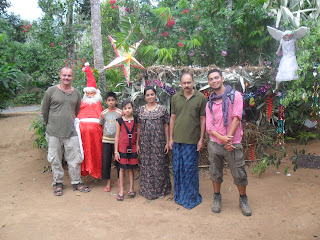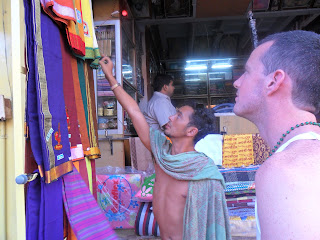We traversed the vast plains and deserts of Northern India riding the magnificent Indian Railways, on our way negotiating hectic cities, camel safaris and damned lies. After a confirmed case of total temple overload and Indian city implosion we finally arrived at our little cocohut in Goa....time to breathe, take stock and get drunk.
 On my first temple visits I was full of fresh curiosity, especially in the mysterious and intricate erotic carvings at the ancient temples of Khajuraho and eagerly followed the full 3 hour audio guide.
On my first temple visits I was full of fresh curiosity, especially in the mysterious and intricate erotic carvings at the ancient temples of Khajuraho and eagerly followed the full 3 hour audio guide.
An obligatory stopover in Agra to visit the marvellous Taj Mahal where we joined the throngs of Indian tourists visiting their proud landmark but the throngs appeared distracted mainly by me. Families were queueing up with their babies to have their photo taken with me and I came away a little starstruck. I was distracted by the interesting poses adopted by Indians. The skies above Agra are yellow from traffic pollution, the streets dirty and the hassle immense so we kept our stopover in Agra brief.


Departure Agra, we arrive at the station at 5 am, scanning the information board I realise our train is not listed. After a bit of queue barging (helpfully this is normal and acceptable behaviour) the station official's grunts confirm my fear that we are at the wrong station. We quickly engage the emergency services of a hasty tuk tuk. He accordingly meets our demand and drives like a lunatic across the city, Wacky Races, tilting the fragile little machine precariously around roundabouts and gets us to the correct station with two minutes to spare. My indifference to safety is growing by the day as a means to get by.
Arrival Anywhere involves shoving our way out of the train station, focussed on the agreed departure strategy. We battle through the assembled irritants vying for the attention of the “white monkeys” with a barrage of direct (and often impertinent) questions:
“What can I do for you?”
“What do you want?”
“Where are you going”
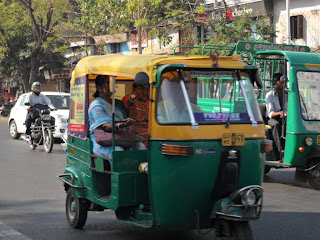
“
Looking for something?”“Auto rickshaw?”
“Hotel?”
Unsure where to start answering some of these questions I resort to my new found Hindi phrase “Nahi chai'iya” - nothing needed
After breaking free from the scrum, the hardcore tuk tuk price bargaining ensues and the struggle to avoid tuk tuk scams which involve taking you to the wrong hotel to get commission or telling that your hotel has burned down. The sheer cheek.
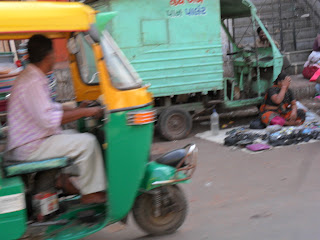
Late Arrival At Jodhpur and another lunatic tuk tuk driver speeds us through another dirty Indian city. Warm musty wind whistles through the open cab and I look out apprehensive of what this “blue city” holds for me. We foil the first tuk tuk scam to take us to the wrong hotel insistent he takes us through the maze of narrow alleys to Hotel Cosy. Hotel Cosy lies nestled on the steep walls of the magnificent fort. And Hotel Cosy is overbooked but the tricky hotelier is in denial and attempts to claim our room is a mattress in a hallway. Tired, irritated and not amused we haughtily gather our belongings and depart to find another hotel. Marching blindly through the dark streets avoiding cow pats and open sewers we are shadowed by the previous tuk tuk man who is determined to get some commission somewhere but we shoo him away.
It's midnight and the streets are nearly deserted, a few old men playing cards in doorways and the dogs on guard of their territory... a black scraggy thing is barking ahead and as we approach his attention focusses on me. The scent of my stress. I dart to a small shop still open and hide behind a random Jain monk who giggles good heartedly. As we venture further the snarling black beast returns. He awakens the interest of the pack scattered on doorways down the street, smelling the blood and fear in the air. Yann threatens a ferocious beast with his bag but they are targeting me. I realise why locals only travel the city streets by motorbike after 10. Dog time begins. By day the scruffy dogs of the street are subdued by the roar of the city around them, seemingly docile. But by night they take over, their howls audible all over the city.

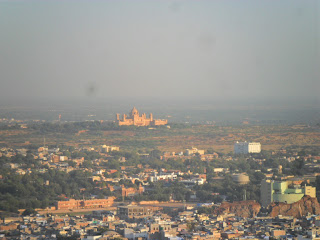
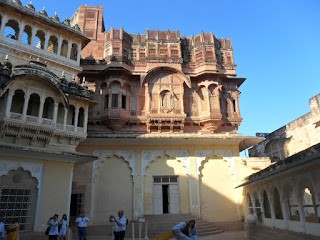

Our terror is over when we are saved by a passing tuk tuk who whisks us away to safety. We then spend much of our time in the blue city in our bright blue hostel apart from a short trip out to the fort.
We see a fine selection of Rajasthani splendour including the fort of Jaisalmer and the palaces of Udaipur but the heat of the desert state is oppressive and we wanna get to the beach. The fort of Jaisalmer is a beautiful golden mound of a city glistening in the sunshine, a feel of Arabia with flat roofed houses, desert and carpet merchants. Unfortunately there is a poor Indian approach to protecting its heritage and environment as seen in the fort of Jaisalmer which is plagued by dangerous motorbikes and shamefully littered with discarded plastic bottles.
We escape to sleep under the stars in the desert.
Udaipur centres round a magical lake surrounded by palaces, famous as the setting for the James Bond film Octopussy. In honour of the great film we attend a screening of the great classic – our best Saturday night in India yet.
Onto Ahmedabad, the great capital city of Gujarat, a dry (in various senses of the word) city of 6 million people with the standard appalling levels of noise and filth. The lack of infrastructure and the levels of poverty are stark. I take a morning walk through the city which depresses me. Awkward lumps shift on the pavement, shrouded in dirty blankets, babies crawl along the dirty pavement, a woman squats over the drain brushing her teeth, dogs calming down after their nightly street patrol, men wake up and sit on benches reading newspapers. Women in dirty saris sweep rubbish with bristly brooms of sticks.
Equally stark is the strict society of Gujarat. I feel for my fellow homosexuals, oppressed by such stifling cultures. There is actually very little for people to do here.
Although Ahmedabad is big, industrial, conservative and busy I feel a certain freedom now away from the stifling tourist towns of Rajasthan, the people who greet me do so with genuine friendly curiosity, no hidden agendas to get me into a shop. I also attend a heritage guided walk and discover the hidden historic soul of the city including the pols – communal living areas, self contained squares where castes have traditionally lived together – lively, friendly places with their own temples and bird tables.
Destination Ahmedabad includes visits to the dance academy and meals with the Indian dancers. An interesting organisation run by a dynasty of influential, philanthropic Gujarati industrialists.
After a faint glimmer of liberal lights in Ahmedabad I notice them shining brighter down the coast in Mumbai.

 We couch surf in New Mumbai, a modern urban sprawl which has sprung up rapidly on the mainland as an overspill to escape the claustrophobia of the crowded island city. A day stuck in New Mumbai partly due to The Slap (of a politician which caused the government to close down the transport system to avoid political riots) and partly due to a huge hangover before venturing into town. We join Mumbaikaran morning commuters and take the much used pastel green suburban rail network (which usually sees people hanging out of trains and crowded on the roof) to journey into the centre which takes an hour. The journey passes by the sea, through jungle and past miles of slums. It's shocking. Incomprehensibly around half of Mumbai's 16 million people live in slums, sometimes with 15,000 people sharing one toilet. The most basic slums are bits of tarpaulin with no walls next to piles of rotting rubbish, the “nicer” slums are precariously built brick structures. Like in Rio backpackers are invited from hostels to go on voyeuristic slum tours which is all a bit sick.
We couch surf in New Mumbai, a modern urban sprawl which has sprung up rapidly on the mainland as an overspill to escape the claustrophobia of the crowded island city. A day stuck in New Mumbai partly due to The Slap (of a politician which caused the government to close down the transport system to avoid political riots) and partly due to a huge hangover before venturing into town. We join Mumbaikaran morning commuters and take the much used pastel green suburban rail network (which usually sees people hanging out of trains and crowded on the roof) to journey into the centre which takes an hour. The journey passes by the sea, through jungle and past miles of slums. It's shocking. Incomprehensibly around half of Mumbai's 16 million people live in slums, sometimes with 15,000 people sharing one toilet. The most basic slums are bits of tarpaulin with no walls next to piles of rotting rubbish, the “nicer” slums are precariously built brick structures. Like in Rio backpackers are invited from hostels to go on voyeuristic slum tours which is all a bit sick.
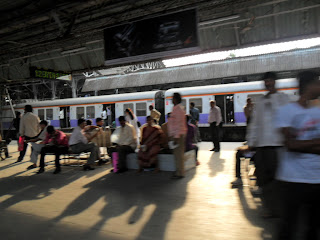
The journey takes you to the tip of the island which is an enclave for modern Mumbaikarans – pretentious moneyed teenagers and Bollywood gliterati. Red London buses and New York style taxis pass down leavy boulevards and past the grand British buildings including the Victoria Terminus modelled on St Pancras and it is very pleasant indeed. We take a boat from the island through the brown sea and take a view of the city shrouded with a beige cloud of smog – all contributing to a film of scum sticking to my body like a parasite.


The city is like a sad Manhattan island mixed with a dirty version of Rio de Janeiro. Like Rio the extremes of rich and poor are immense. We visit Marine Drive, circular road overlooking the sea which has some of the most expensive property in the world. A huge white hotel sparkles perfectly in the evening, an unworldly vision of luxury. Along the road a wretched woman rolls on the floor with black curly hair and an emaciated body caked in mud. I hand her a note and she squints at it, her mind hallucinating with desperate hunger.
More about Goa next time kids.
 Our Christmas journey begins with departure from the paradisical Om Beach; a wonderful unexploited hideaway in our cocohut amongst the palms. The time to leave is nigh as we have become too firmly fixed into the community of the Sangam cocohuts, if we stay much longer we will be babysitting for the blonde Swiss German boys and intervening in their father's overly strict fathering. Or we would end up not containing our cynicism with the preaching of alternative lifestyles by hippies bound for the Rainbow Gathering on Paradise Beach and their futile demonstrations against natural disasters (speed boats). So...departure.
Our Christmas journey begins with departure from the paradisical Om Beach; a wonderful unexploited hideaway in our cocohut amongst the palms. The time to leave is nigh as we have become too firmly fixed into the community of the Sangam cocohuts, if we stay much longer we will be babysitting for the blonde Swiss German boys and intervening in their father's overly strict fathering. Or we would end up not containing our cynicism with the preaching of alternative lifestyles by hippies bound for the Rainbow Gathering on Paradise Beach and their futile demonstrations against natural disasters (speed boats). So...departure.


















